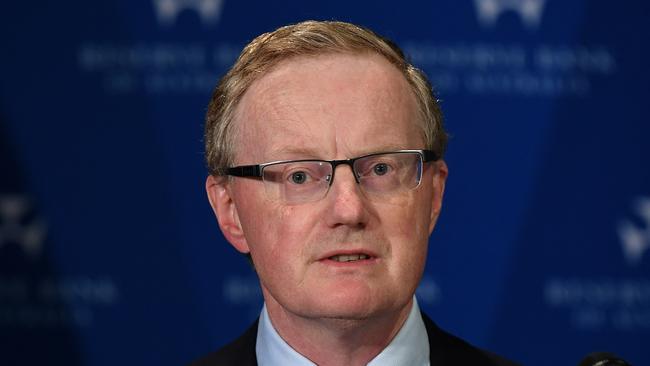Coronavirus: RBA clear that interest rates are going nowhere
The RBA board kept the official cash rate on hold on Tuesday, signalling little prospect of a change.

The first Tuesday of the month, when the Reserve Bank board makes a decision about interest rates, has become a lot duller for economic scribes.
The RBA board kept the official cash rate on hold at a record low of 0.25 per cent on Tuesday, signalling little prospect of a change while the economy grapples with a huge slump in economic activity that includes a baseline scenario of 10 per cent unemployment.
But there’s not much else it could or will do with the cash rate for a long time. The 0.25 per cent rate — reached in mid March — is effectively zero, or the “lower bound”, as economists call it.
For the first time since cash rate targeting began a generation ago, it’s the description of the economic outlook that will matter more each month.
“The board will not increase the cash rate target until progress is being made towards full employment and it is confident that inflation will be sustainably within the 2-3 per cent target band,” the RBA said in a statement accompanying the decision.
“Many people have lost their jobs and a sharp rise in unemployment is occurring,” the RBA added, pencilling in a 10 per cent drop in output ahead of a 6 per cent resurgence next year.
Investors already know the scale of the RBA’s bond-buying program. Since its last board meeting, the RBA has bought $12.3bn in new federal, state and government bonds, bringing the total since it launched quantitative easing in March to just over $50bn.
“At the same time, the containment measures have reduced infection rates in a number of countries. If this continues, a recovery in the global economy will start later this year, supported by both the large fiscal packages and the significant easing in monetary policies,” the RBA said.
The bank for the first time also said it would accept corporate — in addition to federal government — bonds as collateral from banks in return for cash “to assist with the smooth functioning of Australia’s capital markets”.
The RBA’s May rates announcement came hours after Josh Frydenberg addressed the National Press Club in Canberra, where he signalled a gradual lifting of restrictions on economic activity.
For every additional week the current restrictions remain in place, it is estimated the nation will see close to a $4bn reduction in economic activity from a combination of reduced workforce participation, productivity, and consumption, the Treasurer said.
“This is equivalent to what around four million Australians on the median wage would earn in a week,” he said.




To join the conversation, please log in. Don't have an account? Register
Join the conversation, you are commenting as Logout